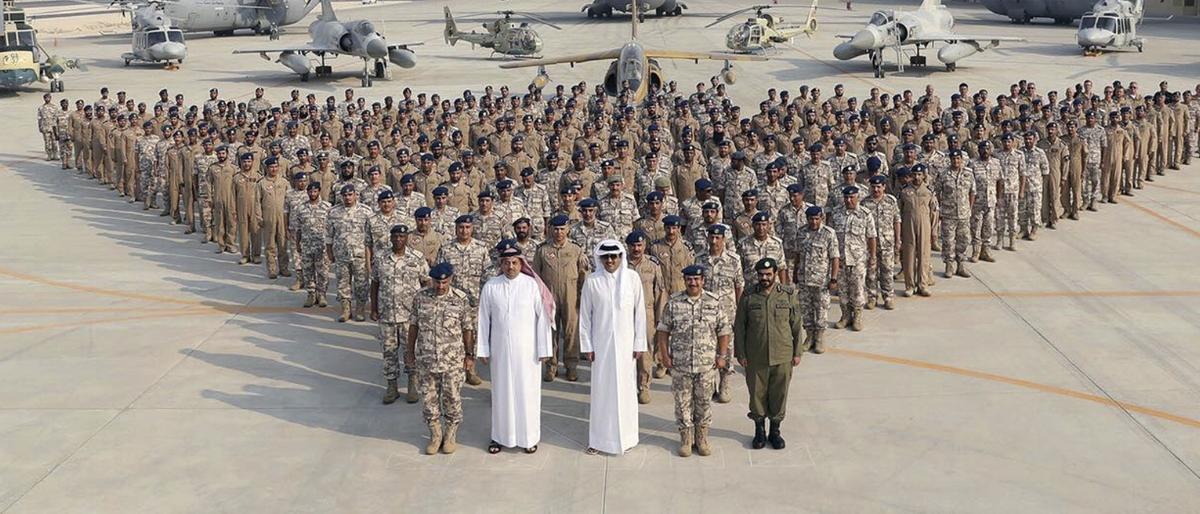Unveiling the Paradox: Arab States and Israel’s Military Alliance in the Midst of Gaza Genocide
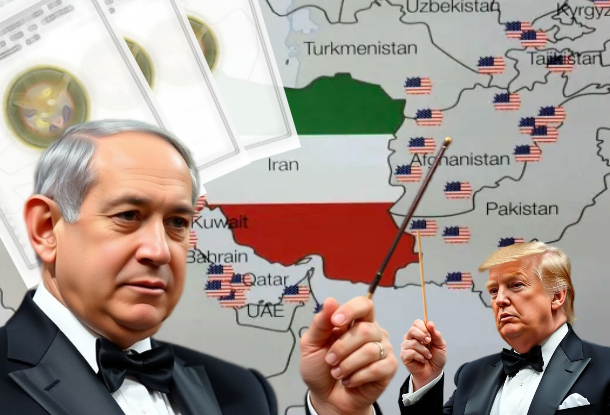
Recently uncovered U.S. government documents, obtained and analyzed by the International Consortium of Investigative Journalists (ICIJ), reveal a significant uptick in military collaboration between Arab nations and Israel as the Gaza conflict rages on. Over the past three years, the United States Central Command (CENTCOM) quietly facilitated a series of high-level discussions and joint training exercises, bringing together top military officials from Israel and six Arab countries—including Bahrain, Egypt, Jordan, and Qatar—to address regional threats, with a particular focus on Iran and the issue of subterranean tunnels.
In May 2024, classified records show, senior military officials from Israel and several Arab nations assembled at al-Udeid Air Base—a sprawling U.S. military hub in Qatar. Notably, a planning memo drafted just 48 hours before the gathering outlined a discreet arrival for the Israeli delegation, bypassing civilian entry points in Qatar to minimize the risk of public scrutiny. The documents paint a clear picture: the perceived threat from Iran—described in some files as part of the “Axis of Evil”—served as the primary catalyst for these deepening alliances, a process orchestrated by U.S. Central Command.
IMAGE: Al Udeid Air Base. (Source: Qatar News Agency)
The Washington Post has analyzed five unclassified PowerPoint presentations from CENTCOM, which were obtained by the International Consortium of Investigative Journalists. These presentations detail the formation of what the U.S. military refers to as the “Regional Security Construct,“ which includes Israel and Qatar, as well as Bahrain, Egypt, Jordan, Saudi Arabia, and the UAE. The documents also include Kuwait and Oman as “potential partners” who were kept apprised of all discussions. The presentations were circulated amongst the partners of the construct, and in some cases were also shared with the “Five Eyes” intelligence alliance, which includes Australia, Canada and New Zealand, Great Britain, and the United States.
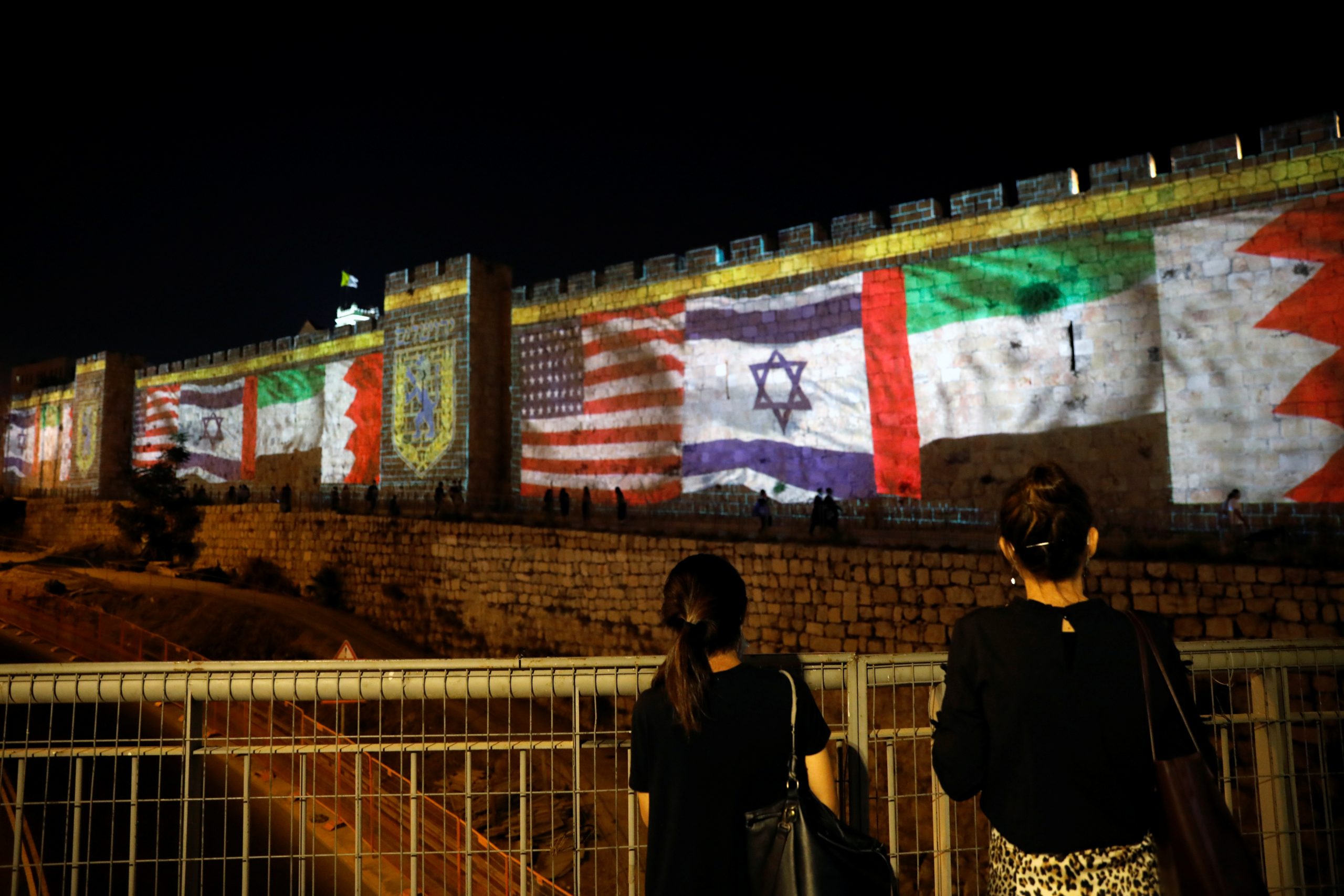
IMAGE: The national flags of the United States, Israel, the United Arab Emirates, Bahrain and Qatar are projected on the walls of Jerusalem’s Old City (Source: Ronen Zvulun/Reuters)
Curiously, one report details an underground tunnel-destruction training program involving six nations, though it keeps their identities under wraps. A 2025 document shows Centcom staff also spearheading strategy sessions to undermine Iran’s image as the Palestinians’ guardian, while amplifying the security construct’s message of regional unity and shared prosperity.
Although U.S. military officials have publicly acknowledged the existence of this regional security partnership, they have not addressed the extent of Israeli-Arab cooperation in these efforts. The WSJ notes the documents show the heart of the framework – an air-defence strategy designed to counter Iran‘s missiles and drones, which has gone from an idea to implementation over 3 years. One briefing document for 2024 proposed that a “Combined Middle East Cyber Center” be established by the end of 2026 to serve as a center for training and exercises for partner nations on defensive cyber operations. Another document recommended an “Information Fusion Center,” a NATO speciality that partners can use to quickly plan, execute, and assess operations in the information domain.
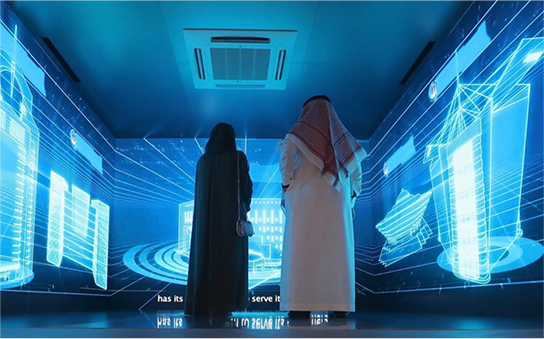
IMAGE: Middle East cyber arms race (Source: Cyfirma)
Saudi Arabia played an important role in the collaboration by sharing intelligence with Israel and Arab partners on many security issues. In a meeting with partners in 2025, a Saudi official and a U.S. intelligence officer presented an “intelligence overview,” which addressed political changes in Syria involving Russia, Turkey, and Kurdish forces. The briefing also flagged threats from the Iran-backed Houthis militant group in Yemen and the activity of the Islamic State in Syria and Iraq. Geopolitically, this new disclosure explains how military collaboration was created on the foundation of the Abraham Accords, with military officials attempting to normalize relations between Israel and Arab allies. All indications suggest that military officials from Arab States, Israel, and CENTCOM were operating quietly behind a green curtain to avoid contentious public political debates about underlying tensions with the parties involved. During his March 15, 2022 congressional testimony, Gen. Kenneth McKenzie, who was the commander of CENTCOM at the time, outlined the security partnership as a way to capitalize on the progress made by the Abraham Accords:
VIDEO: U.S. CENTCOM Commander Gen. Kenneth McKenzie testifying during Senate committee hearing in March 2022 (Source: PBS NewsHour)
.
Israel and Hamas appear to have achieved consensus only on the initial phases of Trump’s peace deal, with serious questions about what happened next in Gaza left unresolved. Similarly, we can expect Gulf states to provide funds and diplomatic support for international troops in Gaza, but without engaging their own military personnel in such a challenging and dangerous assignment.
Given that information, one may wonder if Arab States agree to Trump’s so-called peace deal in Gaza (which they apparently support), in exchange for their ability to back an anticipated US-backed Israeli war with Iran…

IMAGE: Egyptian–American Joint Exercise “Bright Star 2025” … Conducting Free-Fall Parachute Jumps over the Pyramids (Egyptian Armed Forces, MOD)
David Kenner reports for The International Consortium of Investigative Journalists (ICIJ)…
Arab states deepened military ties with Israel while denouncing Gaza war, leak reveals
Israeli and Arab military officials have come together for meetings and training, facilitated by U.S. Central Command, on regional threats, Iran and underground tunnels
Even as key Arab states condemned the war in the Gaza Strip, they quietly expanded security cooperation with the Israeli military, leaked U.S. documents reveal. Those military ties were thrown into crisis after Israel’s September airstrike in Qatar, but could now play a key role in overseeing the nascent ceasefire in Gaza.
Over the past three years, facilitated by the United States, senior military officials from Israel and six Arab countries came together for a series of planning meetings in Bahrain, Egypt, Jordan, and Qatar.
Israel and Hamas agreed on Wednesday to the first phase of a peace framework that would result in the release of all the hostages held by Hamas and a partial Israeli withdrawal from Gaza. U.S. officials announced on Thursday that 200 U.S. troops would be deployed to Israel to provide support to the ceasefire agreement, and would be joined by soldiers from several of the Arab countries that participated in this long-standing security cooperation.
Even before that announcement, the Arab countries involved in this security collaboration had all signaled their support for Trump’s 20-point plan to end the Gaza war. The plan calls for Arab states to participate in the deployment of an international force to Gaza that would train a new Palestinian police force in the region. In a joint statement, five of the six Arab countries said that they supported the establishment of a mechanism that “guarantees the security of all sides,” but they have stopped short of publicly committing to deploy military forces.
Qatar, whose capital was struck on Sept. 9 by Israeli missiles targeting Hamas leaders, was one of the countries that had quietly strengthened ties with the Israeli military. In May 2024, the documents show, senior Israeli and Arab military officials convened at Al Udeid Air Base, a major U.S. military facility in Qatar. A planning document for the event, written two days before it was to begin, shows that the Israeli delegation was scheduled to fly directly to the airbase, circumventing Qatar’s civilian points of entry that could have risked public exposure.

IMAGE: Journalists watch Qatar’s Emir Sheikh Tamim bin Hamad Al-Thani’s address during the 2025 Arab-Islamic emergency summit in Doha on Sept. 15, 2025, following the Israeli attack on senior Hamas officials. (Source: Mahmud Hams / AFP)
Israeli Prime Minister Benjamin Netanyahu apologized to Qatar on Sept. 29 for the strike, after prompting from the Trump administration, and pledged not to conduct such attacks in the future.
The documents show that the threat posed by Iran was the driving force behind the closer ties, which have been fostered by the U.S. military’s Central Command, known as CENTCOM. One document describes Iran and its allied militias as the “Axis of Evil,” and another includes a map with missiles superimposed over Gaza and Yemen, where Iranian allies hold power.
Five CENTCOM PowerPoint presentations, obtained by the International Consortium of Investigative Journalists and reviewed by The Washington Post, detail the creation of what the U.S. military describes as the “Regional Security Construct.” In addition to Israel and Qatar, the construct includes Bahrain, Egypt, Jordan, Saudi Arabia and the United Arab Emirates. The documents refer to Kuwait and Oman as “potential partners” who were briefed on all meetings.
The presentations are marked unclassified and were distributed to the construct’s partners, and in some cases also to the “Five Eyes” intelligence alliance comprising Australia, Canada, New Zealand, Britain, and the United States. They were written between 2022 and 2025, before and after the launch of Israel’s war in Gaza in October 2023.
ICIJ and The Washington Post verified the authenticity of the documents by cross-checking key details against official Defense Department records, archived military documents, and other open sources. The dates and locations of publicly announced military exercises and meetings matched official U.S. military releases, and the names, ranks, and positions of U.S. and foreign military officials aligned with public records.
CENTCOM officials declined to comment on this article. Israel and the six Arab countries that are part of the construct did not respond to requests for comment.
One meeting in particular, in January 2025 at Fort Campbell Army base, roughly an hour’s drive from Nashville, Tenn., included sessions where U.S. forces trained partners on how to detect and neutralize threats posed by subterranean tunnels — a key tool used by Hamas against the Israeli military in the Gaza Strip. Another document describes partners from six countries participating in a training to destroy underground tunnels, but does not name the countries.
CENTCOM personnel also led planning meetings to launch information operations to counter Iran’s narrative that it is the regional protector of Palestinians, and, according to a 2025 document, to “propagate [a] partner narrative of regional prosperity and cooperation.”

IMAGE: A smoke plume billows following Israeli bombardment on the Gaza Strip as seen from northwest of Nuseirat refugee camp in Gaza, on Oct. 9, 2025. (Source: Photo by Majdi Fathi/NurPhoto via Getty Images)
Even as security cooperation with Israel expanded behind closed doors, Arab leaders denounced its war in Gaza. The leaders of Egypt, Jordan, Qatar and Saudi Arabia said the Israeli campaign amounted to a genocide. Qatar’s leaders have issued some of the most scathing condemnations: At the U.N. General Assembly in September, the Qatari emir called the conflict “a genocidal war waged against the Palestinian people” and accused Israel of being “a state hostile to its environment, complicit in building an apartheid system.” The Saudi Foreign Ministry condemned Israel in August for what it described as the “starvation” and “ethnic cleansing” of Palestinians.
In a nod to political sensitivities, the documents state that the partnership “does not form a new alliance” and that all meetings would be “held in confidence.”
Emile Hokayem, director of regional security at the International Institute for Strategic Studies think tank, said the United States has long hoped that military cooperation would bring about political normalization between Israel and the Arab states. However, while quietly working with the countries’ military leaders may dodge thorny political discussions, this approach also “obscures or hides the reality” of the tensions between the parties, he said.
Those tensions, Hokayem said, were now on full display after the Israeli strike in Qatar. “A key member of the American effort has attacked another, with America seen as complacent, complicit or blind,” he said. “The resulting distrust will mar American efforts for years to come.”
A quiet partnership
U.S. military officials have publicly acknowledged the existence of the Regional Security Construct but not spoken about the extent of Israeli-Arab cooperation in those efforts. In 2022, Gen. Kenneth “Frank” McKenzie, then CENTCOM’s commander, described the partnership in congressional testimony as an effort “building on [the] momentum of the Abraham Accords,” the agreement establishing diplomatic ties between Israel and Morocco, the United Arab Emirates and Bahrain.
The documents show how the centerpiece of the construct, an air-defense plan to combat Iran’s missiles and drones, moved from theory to reality over the past three years. Israel and the Arab countries signed on to this plan at a 2022 security conference, agreeing to coordinate military exercises and procure the equipment to make it possible. By 2024, CENTCOM successfully linked many of the partner states to its systems, according to the leaked documents, allowing them to provide radar and sensor data to the U.S. military and, in turn, view the combined data of the partners.
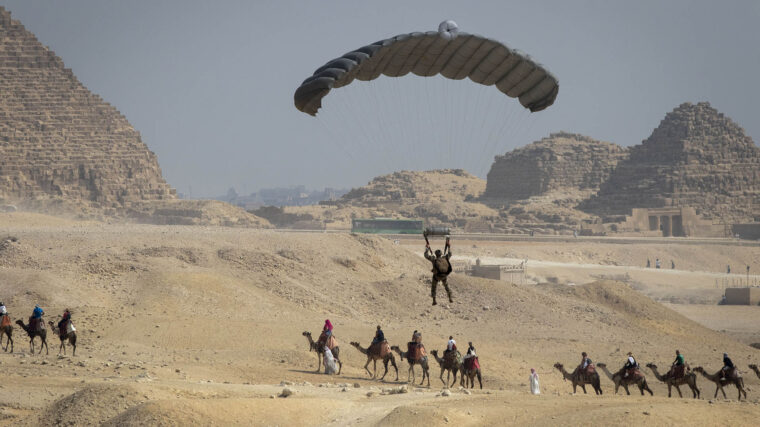
IMAGE: U.S. service members conduct airborne operations during a jump over the Giza Pyramid Complex during exercise BRIGHT STAR 25 in September 2025. (Source: U.S. Army / Grace Nechanicky)
A briefing document stated that six of the seven partner nations were receiving a partial air picture of the region through Defense Department systems, and that two countries were sharing their own radar data through a U.S. Air Force squadron. Partner nations were also being onboarded to a U.S.-run secure chat system so that they could communicate with each other and the U.S. military.
The air-defense system, however, did nothing to protect Qatar against Israel’s Sept. 9 strike on its capital. U.S. satellite and radar systems did not provide an early warning of the strike, U.S. Air Force Lt. Gen. Derek France told reporters, because those systems “are typically focused on Iran and other [areas] where we expect an attack to come from.” Qatar said that its radar systems also failed to detect the missile launches by Israeli fighter jets.
While Qatar and Saudi Arabia do not have formal diplomatic relationships with Israel, the CENTCOM documents show the important behind-the-scenes role that both powerful Gulf states played in this nascent partnership.
The May 2024 security conference at Al Udeid Air Base underscored the increased cooperation, with Israeli officials holding bilateral discussions with representatives from each of the attending Arab countries.
The conference also highlighted the diplomatic sensitivities inherent in these gatherings. A heading reading “MUST NOT DO” informed participants that they should not take photographs or provide access to the media. A bolded note above the itinerary reminded staff of culinary restrictions for Jewish and Muslim participants: “No pork/crustaceans.”
Saudi Arabia also played an active role in this collaboration, sharing intelligence with Israel and Arab partners on a broad range of security issues. In a 2025 meeting, a Saudi official and a U.S. intelligence official provided an “intelligence overview” to partners on political developments in Syria, including the role played by Russia, Turkey and Kurdish forces in the country. The briefing also covered the threats posed by the Iran-backed Houthis militant group in Yemen and the Islamic State’s operations in Syria and Iraq.
CENTCOM military planners are working to foster closer ties between Israel and Arab states in the years ahead.
A 2024 briefing document envisioned the creation of a “Combined Middle East Cyber Center” by the end of 2026 to serve as a headquarters for education and exercises on defensive cyber operations. Another document advocated for the creation of an “Information Fusion Center” for partners to “rapidly plan, execute, and assess operations in the information environment.”
A former U.S. defense official, speaking on the condition of anonymity to discuss sensitive military issues, said that these engagements reflected the Gulf Arab states’ pragmatic ties with Israel — and their respect for its military prowess. “They all seem to think the Israelis can do whatever they want, whenever they want, without detection,” the former official said.
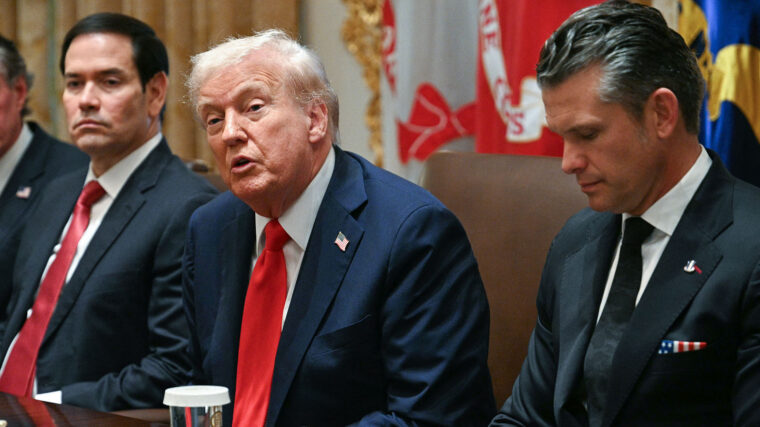
IMAGE: U.S. President Donald Trump with Secretary of State Marco Rubio (left) and Secretary of Defense Pete Hegseth (right), during a cabinet meeting on Oct. 9, 2025. (Source: Jim Watson/AFP via Getty Images)
Israel and Hamas appeared to have only agreed to the initial phases of a peace deal, leaving broader questions about how Gaza is to be governed unresolved. Security analysts said Gulf states could provide financial and diplomatic support for an international force in Gaza, but would probably refrain from committing their own military forces to the complex and dangerous mission.
“There’s a lot of concern in Gulf states about what an unshackled Israel is going to do,” said Thomas Juneau, a professor at the University of Ottawa whose work focuses on Middle East security issues. “But at the same time, they are reliant on the U.S. as the guarantor of their security … and they are also very concerned about Iran.”
The Washington Post and ICIJ collaborated on this report. Dan Lamothe contributed to this article.
See more reports from The International Consortium of Investigative Journalists (ICIJ)
READ MORE MIDDLE EAST NEWS AT: 21st CENTURY WIRE MIDDLE EAST FILES
SUPPORT OUR INDEPENDENT MEDIA PLATFORM – BECOME A MEMBER @21WIRE.TV
VISIT OUR TELEGRAM CHANNEL
21st Century Wire is an alternative news agency designed to enlighten, inform and educate readers about world events which are not always covered in the mainstream media.
Source: https://21stcenturywire.com/2025/10/13/unveiling-the-paradox-arab-states-and-israels-military-alliance-in-the-midst-of-gaza-genocide/
Anyone can join.
Anyone can contribute.
Anyone can become informed about their world.
"United We Stand" Click Here To Create Your Personal Citizen Journalist Account Today, Be Sure To Invite Your Friends.
Before It’s News® is a community of individuals who report on what’s going on around them, from all around the world. Anyone can join. Anyone can contribute. Anyone can become informed about their world. "United We Stand" Click Here To Create Your Personal Citizen Journalist Account Today, Be Sure To Invite Your Friends.
LION'S MANE PRODUCT
Try Our Lion’s Mane WHOLE MIND Nootropic Blend 60 Capsules
Mushrooms are having a moment. One fabulous fungus in particular, lion’s mane, may help improve memory, depression and anxiety symptoms. They are also an excellent source of nutrients that show promise as a therapy for dementia, and other neurodegenerative diseases. If you’re living with anxiety or depression, you may be curious about all the therapy options out there — including the natural ones.Our Lion’s Mane WHOLE MIND Nootropic Blend has been formulated to utilize the potency of Lion’s mane but also include the benefits of four other Highly Beneficial Mushrooms. Synergistically, they work together to Build your health through improving cognitive function and immunity regardless of your age. Our Nootropic not only improves your Cognitive Function and Activates your Immune System, but it benefits growth of Essential Gut Flora, further enhancing your Vitality.
Our Formula includes: Lion’s Mane Mushrooms which Increase Brain Power through nerve growth, lessen anxiety, reduce depression, and improve concentration. Its an excellent adaptogen, promotes sleep and improves immunity. Shiitake Mushrooms which Fight cancer cells and infectious disease, boost the immune system, promotes brain function, and serves as a source of B vitamins. Maitake Mushrooms which regulate blood sugar levels of diabetics, reduce hypertension and boosts the immune system. Reishi Mushrooms which Fight inflammation, liver disease, fatigue, tumor growth and cancer. They Improve skin disorders and soothes digestive problems, stomach ulcers and leaky gut syndrome. Chaga Mushrooms which have anti-aging effects, boost immune function, improve stamina and athletic performance, even act as a natural aphrodisiac, fighting diabetes and improving liver function. Try Our Lion’s Mane WHOLE MIND Nootropic Blend 60 Capsules Today. Be 100% Satisfied or Receive a Full Money Back Guarantee. Order Yours Today by Following This Link.




